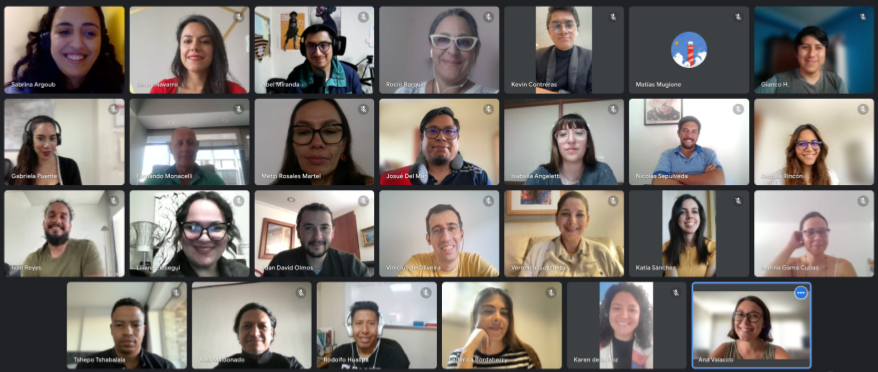Breaking Barriers: The Impact of Spanish-Language AI Academy in Latin America
The JournalismAI Academy for Small Newsrooms recently concluded its inaugural edition in Spanish, marking a significant milestone in empowering Latin American journalists with AI literacy and implementation skills.
The programme included 20 participants from Argentina, Bolivia, Brazil, Chile, Colombia, Costa Rica, Cuba, Ecuador, El Salvador, Guatemala, Honduras, Mexico, Peru, Uruguay, and Venezuela, and was led by instructors with extensive regional experience who guided participants through the intricacies of AI integration in journalism, focusing on the specific - both technological and journalistic - challenges of the Latin American context.
After a month of the Academy's conclusion, we reached out to two participants, Liliana Elósegui and Karen De la Hoz, to gather their feedback on the programme's impact and how they implemented their learnings in their respective newsrooms.
Meet Liliana and Karen
Liliana and Karen were both enthusiastic participants in the JournalismAI Academy for Small Newsrooms.
Liliana is the co-founder and editorial director of VerificadoMX, a prominent organisation dedicated to fact-checking and combating misinformation in Mexico. With a deep commitment to journalistic integrity and human rights advocacy, Liliana has amassed a wealth of expertise in verification, public discourse analysis, and human rights.
Karen is the product owner of the Colombian publication La Silla Vacia, where she is leading the adoption of artificial intelligence for editorial projects and training the team in AI usage. As journalists from Latin America, they were eager to enhance their understanding of AI and its applications in journalism. After completing the eight-week training course, they returned to their newsrooms armed with newfound knowledge and insights.
Exploring AI Integration in Editorial Workflow
Liliana initiated mini-sessions within her editorial team, sharing AI insights and exploring its applicability to their workflow. She emphasized the importance of identifying problems and assessing AI's necessity. Similarly, Karen appreciated the Academy's focus on product management and AI's role in addressing journalistic challenges. Liliana's proactive approach inspired her team to explore AI's potential in their workflow, while Karen's dissemination of knowledge within her newsroom fostered a culture of continuous learning and adaptation. Liliana's team experimented with various AI tools, from Bard for social media copies to TL;DR for interview transcriptions, showcasing a proactive approach to integration. Karen, on the other hand, valued the resources and insights gained, sharing them with her team at La Silla Vacía to facilitate capacity-building and adaptation.
Regional Relevance Embracing Spanish-Language Instruction
Both Liliana and Karen highlighted the significance of the Academy's Spanish-language focus. Liliana emphasized the importance of regional instructors' insights, while Karen appreciated the opportunity to engage with instructors rooted in the Spanish-speaking context.
"El principal valor que resalto de la Academia es que se haya desarrollado completamente en español. La mayoría de referentes que vemos en Latinoamérica son de Estados Unidos y de Europa. Tener la posibilidad de compartir con instructores que han trabajado en el sur global y/o en español, nos acerca a la tecnología, nos permite crear redes de colaboración, y nos ayuda a anticipar retos únicos que enfrentamos y enfrentaremos quienes trabajamos con IA en la región." - Karen De La Hoz, Product Owner, La Silla Vacia.
"The main value that I highlight from the Academy is that it was developed entirely in Spanish. Most of the references we see in Latin America are from the United States and Europe. Having the opportunity to share with instructors who have worked in the global south and/or in Spanish brings us closer to technology, allows us to create collaboration networks, and helps us anticipate the unique challenges that we face and will face as we work with AI in the region." - Karen De La Hoz, Product Owner, La Silla Vacia.
The JournalismAI Academy for Small Newsrooms has emerged as a catalyst for empowering Latin American journalists to embrace AI technologies effectively. Through comprehensive training, regional expertise, and a focus on practical application, the Academy equips participants with the tools and mindset needed to navigate the evolving media landscape.
Liliana and Karen's experiences reflect the programme's transformative potential, from fostering innovation and efficiency within newsrooms to promoting collaboration and addressing unique regional challenges. Since its inception in 2021, the Academy has reached over 120 news organisations from 62 countries, spreading awareness about the potential of AI for journalists and media professionals in small newsrooms.

